Love Happens
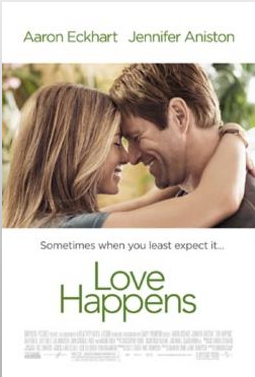
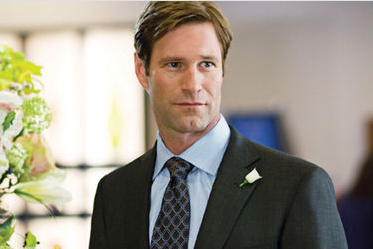 We're introduced to Eckhart's character first. He's Burke Ryan, a self-help guru who helps people get over the death of loved ones. He's written a best-selling book, and goes coast-to-coast doing seminars where he preaches his words of wisdom. The irony is he doesn't believe his own words. He suffered a loss himself when his wife died in a car accident three years ago, and can't get over his own grief. The people at his seminars who hang on his very word treat him like a celebrity, but there are some, like his father-in-law (Martin Sheen), who see him as a hypocrite. Enter Aniston's character, Eloise. She's a florist who does the flower arrangements at the hotel where he's currently hosting a seminar for a few days. They meet when they literally bump into each other in the hall. He tries to strike up a conversation, but she pretends she's deaf, because she just broke up with a boyfriend and doesn't want anything to do with men. It's the first of many artificial sitcom-like situations the screenplay throws into what was supposed to be a story about getting over loss and emotional healing.
We're introduced to Eckhart's character first. He's Burke Ryan, a self-help guru who helps people get over the death of loved ones. He's written a best-selling book, and goes coast-to-coast doing seminars where he preaches his words of wisdom. The irony is he doesn't believe his own words. He suffered a loss himself when his wife died in a car accident three years ago, and can't get over his own grief. The people at his seminars who hang on his very word treat him like a celebrity, but there are some, like his father-in-law (Martin Sheen), who see him as a hypocrite. Enter Aniston's character, Eloise. She's a florist who does the flower arrangements at the hotel where he's currently hosting a seminar for a few days. They meet when they literally bump into each other in the hall. He tries to strike up a conversation, but she pretends she's deaf, because she just broke up with a boyfriend and doesn't want anything to do with men. It's the first of many artificial sitcom-like situations the screenplay throws into what was supposed to be a story about getting over loss and emotional healing.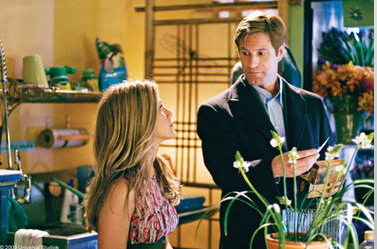 Burke eventually convinces Eloise to go out to dinner with him. Before long, they're hanging out together, and visiting trendy night spots. Things get serious after that. They go to a rock concert together, he visits her mother (Frances Conroy), and she helps him break into his father-in-law's house so he can steal a pet bird that used to belong to his wife, so he can set it free. (It's a long story.) All this happens, but we never feel a real connection between them. I get that this is supposed to be a very guarded relationship. Everywhere Burke goes, he has flashbacks of his dead wife. But the screenplay by director Brandon Camp and co-writer Mike Thompson (Dragonfly) never goes deep enough into the characters, their problems, or even what draws them to each other. Both writers have a lot of experience writing for television, and it shows. The drama is neat, tidy, non-threatening, and sanitized. The comic moments also have a sitcom-like quality, with the characters intentionally putting themselves in awkward situations (you can almost hear the laugh track), or provided by the two comic relief characters (Dan Fogler as Burke's agent, and Judy Greer as Eloise's best friend and co-worker).
Burke eventually convinces Eloise to go out to dinner with him. Before long, they're hanging out together, and visiting trendy night spots. Things get serious after that. They go to a rock concert together, he visits her mother (Frances Conroy), and she helps him break into his father-in-law's house so he can steal a pet bird that used to belong to his wife, so he can set it free. (It's a long story.) All this happens, but we never feel a real connection between them. I get that this is supposed to be a very guarded relationship. Everywhere Burke goes, he has flashbacks of his dead wife. But the screenplay by director Brandon Camp and co-writer Mike Thompson (Dragonfly) never goes deep enough into the characters, their problems, or even what draws them to each other. Both writers have a lot of experience writing for television, and it shows. The drama is neat, tidy, non-threatening, and sanitized. The comic moments also have a sitcom-like quality, with the characters intentionally putting themselves in awkward situations (you can almost hear the laugh track), or provided by the two comic relief characters (Dan Fogler as Burke's agent, and Judy Greer as Eloise's best friend and co-worker).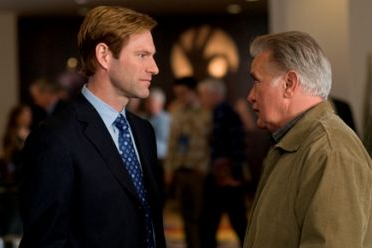 It's these contrived, safe decisions that holds Love Happens back from the movie it obviously wants to be. It's afraid to truly confront the issue of loss and recovery, and gives us simple answers. There's a recurring character who keeps on showing up at Burke's seminars named Walter (John Caroll Lynch). He used to be a successful contractor, but then his son died in an accident on a job site, and now he feels like he has nothing left. He even gave up on being a contractor. Burke tries to reach him, but Walter keeps on resisting. That's when he gets the brilliant idea to take Walter on a field trip to a Home Depot. Through this trip, Walter seemingly has a life-changing experience. He can hold onto a hammer again without thinking of his son's death. He tells Burke that he's going to be okay, and that's all we get. So, instead of actual closure to the character, we get a music montage as Walter picks out tools, and a plug for the Home Depot. If only all emotional problems could be solved with the aid of corporate product placements.
It's these contrived, safe decisions that holds Love Happens back from the movie it obviously wants to be. It's afraid to truly confront the issue of loss and recovery, and gives us simple answers. There's a recurring character who keeps on showing up at Burke's seminars named Walter (John Caroll Lynch). He used to be a successful contractor, but then his son died in an accident on a job site, and now he feels like he has nothing left. He even gave up on being a contractor. Burke tries to reach him, but Walter keeps on resisting. That's when he gets the brilliant idea to take Walter on a field trip to a Home Depot. Through this trip, Walter seemingly has a life-changing experience. He can hold onto a hammer again without thinking of his son's death. He tells Burke that he's going to be okay, and that's all we get. So, instead of actual closure to the character, we get a music montage as Walter picks out tools, and a plug for the Home Depot. If only all emotional problems could be solved with the aid of corporate product placements.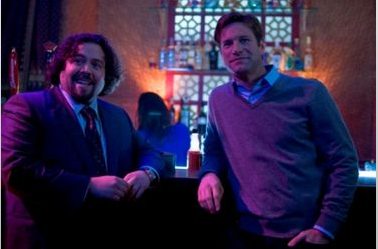 But, back to Burke and Eloise. We never get to see any sparks, nor do we get a scene where we really feel the characters are connecting. It's strange, because we know that Eckhart and Aniston are very charismatic actors, or at least they have been in the past. There's none of the sharp comic glee that Eckhart usually brings to his roles. As for Aniston, there's something a little muted about her performance here, almost as if her heart wasn't completely into it. We still wind up liking the characters, due to the actors playing them. We just don't like them as much as we want to. At least everyone seems to be trying. You have to give credit for Martin Sheen. It couldn't have been easy to walk onto the set the day of his big scene, which is not only horribly contrived (he walks in just as Burke is giving an impassioned apology to his audience, and he winds up walking on stage to also apologize to and hug his son-in-law), but also includes one of the worst cliches - the slow, building clap, where one audience member starts clapping, and then he is joined by one or two more people, and soon the entire room is in thunderous applause.
But, back to Burke and Eloise. We never get to see any sparks, nor do we get a scene where we really feel the characters are connecting. It's strange, because we know that Eckhart and Aniston are very charismatic actors, or at least they have been in the past. There's none of the sharp comic glee that Eckhart usually brings to his roles. As for Aniston, there's something a little muted about her performance here, almost as if her heart wasn't completely into it. We still wind up liking the characters, due to the actors playing them. We just don't like them as much as we want to. At least everyone seems to be trying. You have to give credit for Martin Sheen. It couldn't have been easy to walk onto the set the day of his big scene, which is not only horribly contrived (he walks in just as Burke is giving an impassioned apology to his audience, and he winds up walking on stage to also apologize to and hug his son-in-law), but also includes one of the worst cliches - the slow, building clap, where one audience member starts clapping, and then he is joined by one or two more people, and soon the entire room is in thunderous applause.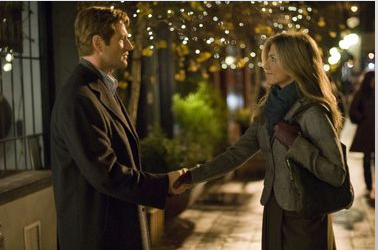
See related merchandise at Amazon.com!






0 Comments:
Post a Comment
<< Home